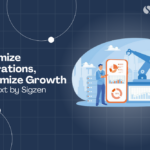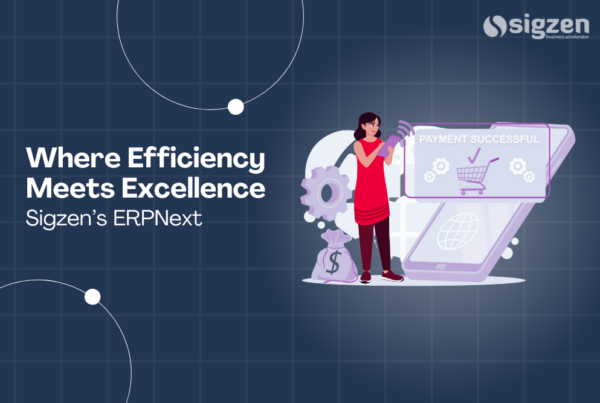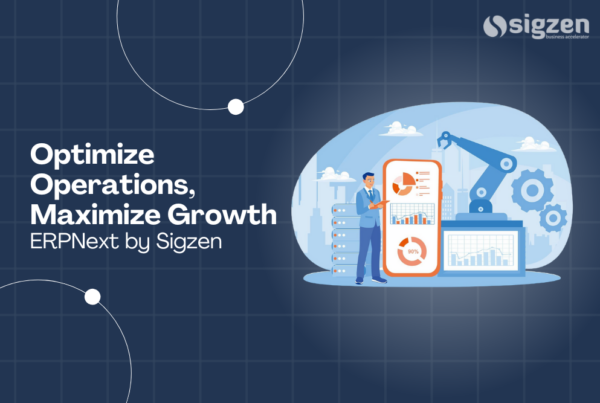
In the fast-paced world of modern business, where every transaction counts and financial mastery is key, Sigzen Technologies emerges as a trailblazer, transforming conventional approaches to accounting and finance. As a leading service provider, Sigzen Technologies understands the intricate demands of contemporary businesses, and their integration of ERPNext represents a paradigm shift in how organizations manage their financial landscapes.
At Sigzen Technologies, the focus extends beyond providing services; it encompasses a dedication to understanding the unique challenges faced by each client. The company’s ethos revolves around delivering tailored solutions that not only meet current needs but also anticipate future demands. With a team of seasoned professionals and a customer-centric approach, Sigzen Technologies has carved a niche for itself as a trusted partner in the journey of business growth and financial prosperity.
ERPNext Accounting and Finance Excellence
General Ledger
The General Ledger in ERPNext serves as the foundational hub for financial data, acting as a comprehensive record-keeping system for all transactions within an organization. It categorizes and organizes financial information, providing a clear and centralized overview of a company’s financial health. By capturing every debit and credit entry, the General Ledger ensures accuracy in financial reporting and facilitates efficient management of accounts.
Accounts Receivable
ERPNext’s Accounts Receivable module is designed to streamline and manage the inflow of funds from customers who have received goods or services on credit. This feature tracks outstanding invoices, monitors payment timelines, and aids in maintaining healthy cash flow by ensuring timely collection of receivables. It is an integral component for businesses that extend credit terms to their customers.
Accounts Payable
The Accounts Payable module in ERPNext is a crucial element for handling the organization’s obligations to suppliers and vendors. It efficiently manages the payment of invoices, tracks due dates, and helps maintain positive relationships with suppliers. By ensuring timely payments, this feature contributes to favorable terms and sustainable partnerships with vendors.
Financial Statements
ERPNext’s Financial Statements feature encompasses the generation of key documents such as the income statement, balance sheet, and cash flow statement. These statements provide a comprehensive snapshot of the company’s financial performance, position, and liquidity, offering stakeholders valuable insights for decision-making and strategic planning.
Bank & Multi-Currency
The Bank & Multi-Currency module in ERPNext empowers businesses to manage multiple bank accounts seamlessly and conduct transactions in various currencies. This functionality is essential for organizations engaged in international trade or operating in diverse markets, enabling them to navigate the complexities of global transactions and currency fluctuations.
Budgeting
Budgeting in ERPNext is a dynamic tool for planning and controlling financial activities within an organization. It allows businesses to set financial goals, allocate resources efficiently, and monitor performance against established benchmarks. This feature promotes fiscal responsibility and strategic financial management.
Profitability Analysis
The Profitability Analysis feature in ERPNext enables businesses to assess and optimize their revenue-generating activities. By analyzing the profitability of products, services, customers, or business segments, organizations can make informed decisions to enhance overall financial performance and sustainability.
Bank Reconciliation
Bank Reconciliation in ERPNext is a critical process that ensures the alignment of internal financial records with external bank statements. This feature helps identify and rectify discrepancies, ensuring the accuracy of financial data. It is an essential step in maintaining financial integrity and trustworthiness.
Fixed Assets
ERPNext’s Fixed Assets module is dedicated to tracking and managing long-term assets owned by the organization. This feature assists in recording asset details, calculating depreciation, and ensuring compliance with accounting standards. It is instrumental in safeguarding and optimizing the use of valuable assets over time.
Financial Reports
Financial Reports in ERPNext encompass a range of documents and analyses that provide a detailed view of various financial metrics. These reports, including income statements, balance sheets, and cash flow statements, offer stakeholders the information needed to evaluate performance, make informed decisions, and communicate financial health effectively.
Multi-Currency Support
Multi-Currency Support in ERPNext is a key functionality for businesses engaged in international transactions. This feature enables seamless handling of transactions in different currencies, ensuring accurate accounting and financial reporting in a global business environment.
Tax Management
ERPNext’s Tax Management module simplifies the complex task of managing and complying with tax regulations. It facilitates the calculation, reporting, and submission of various taxes, ensuring that the organization remains in compliance with local and international tax laws.
Cost Centers
Cost Centers in ERPNext provide a structured way to allocate and analyze expenses related to specific activities, departments, or projects within an organization. This feature enhances visibility into the cost structure of the business, aiding in informed decision-making and resource allocation.
Business Scenario for Accouting module of ERPNext
In the current business scenario, ERPNext’s accounting features play a pivotal role in addressing the complex financial challenges faced by organizations. The General Ledger remains the heart of financial management, ensuring that businesses maintain accurate and up-to-date records of their transactions. This is particularly crucial in an era where regulatory compliance and financial transparency are paramount.
With the rise of e-commerce and global markets, the Accounts Receivable module is indispensable for businesses extending credit to customers. Timely tracking and collection of receivables are critical for maintaining healthy cash flow, especially in industries where payment cycles can vary.
Similarly, the Accounts Payable module continues to be essential in the current business landscape, ensuring that organizations manage their relationships with suppliers efficiently. Timely payments strengthen partnerships, contributing to a smooth and reliable supply chain.
As businesses navigate the complexities of the global economy, the Bank & Multi-Currency feature becomes increasingly relevant. This capability enables companies to operate in multiple currencies seamlessly, facilitating international transactions and mitigating the risks associated with currency fluctuations.
In a rapidly changing economic environment, robust Budgeting tools are indispensable. They allow organizations to adapt to dynamic market conditions, allocate resources effectively, and respond strategically to unforeseen challenges. This is particularly crucial in times of economic uncertainty.
The Profitability Analysis feature is vital in the current scenario as businesses seek ways to optimize revenue streams. By analyzing the profitability of products, services, or market segments, organizations can make informed decisions to enhance overall financial performance and sustainability.
Banking and financial operations are subject to constant change, and the Bank Reconciliation module remains critical for ensuring the accuracy and reliability of financial data. This feature is especially relevant in an era where digital transactions are on the rise, requiring businesses to reconcile various financial sources.
With technology evolving rapidly, the Fixed Assets module aids businesses in managing their long-term assets efficiently. This is particularly relevant in industries where technological advancements are frequent, and companies need to keep track of their valuable assets.
Financial reporting has become more sophisticated, with stakeholders expecting comprehensive insights. ERPNext’s Financial Reports feature addresses this need by providing detailed analyses, enabling businesses to communicate their financial health effectively and make data-driven decisions.
As businesses operate on a global scale, the Multi-Currency Support feature is crucial for accurate accounting in diverse markets. It ensures that international transactions are seamlessly integrated into financial records, reducing the complexities associated with multiple currencies.
Tax regulations are becoming increasingly complex and stringent. The Tax Management module is indispensable for businesses navigating the intricate landscape of tax compliance, ensuring accurate calculations and timely submissions.
Finally, in a business environment that demands efficiency and accountability, the Cost Centers feature provides organizations with a granular view of their expenses. This aids in strategic decision-making, allowing businesses to allocate resources effectively and optimize their cost structures.
In summary, ERPNext’s accounting features are well-aligned with the demands of the contemporary business landscape, offering solutions to the multifaceted financial challenges faced by organizations in an era of globalization, digital transformation, and regulatory complexity.
Conclusion
In the grand narrative of business success, Sigzen Technologies stands as a beacon, redefining accounting and finance with ERPNext. This partnership is not just about software; it’s about a commitment to excellence, precision, and strategic financial management. As businesses navigate the complexities of a globalized and digital world, Sigzen Technologies, guided by ERPNext, stands as a testament to the art of wealth mastery. In this dynamic partnership, organizations don’t just keep pace; they lead in the ever-evolving landscape of finance and accounting, empowered by Sigzen Technologies’ expertise and ERPNext’s transformative capabilities.





